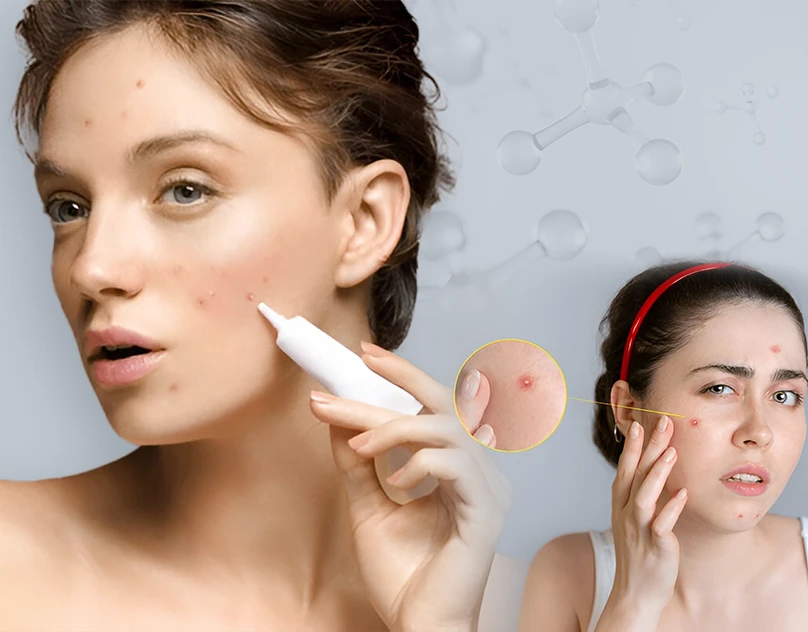

How To Prevent Acne From the Inside Out (DNA Can Help Too!)
Have you looked in the mirror and seen a little red bump that has started to pop up? Yep, we are talking about scary and common acne! Those annoying pimples, blackheads, and whiteheads can make one feel shy. But guess what? You do not have to just deal with them throughout! There are some that shall help you to know how to prevent acne and help your skin stay super clear and happy.
Get to know some secrets on how to prevent acne. Know some simple things that can be done every day. Learn why those genes might play a role in acne, and even how cool new science can give special clues about your skin.
What Is Up With Acne Anyway?
First things first, let us understand what the condition of acne is. Our skin has tiny little holes known as pores. Inside some of these pores are those oil glands that make a natural oil called sebum. Sebum is a good substance!
But sometimes, several things might go wrong.
- Too much oil: Our skin might make too much amount of sebum.
- Dead skin cells: Tiny flakes of dead skin shall further get stuck inside those pores.
- Germs (bacteria): Special little germs which might live on the skin can get trapped too.
When some of these mentioned three things shall mix, they can all clog up the pore. And this leads to the birth of the pimple. It can look like a red bump, a black dot, or a sometime like a white bump.
Simple Steps for Super Clear Skin!
Okay, now for the fun part: how to simply fight back against those acne!
Wash Your Face, Remember To Be Gentle!
The first and the foremost important step! You need to wash your face at regular intervals. This will help to get rid of extra oil, dirt, and makeup too.
- How often? Wash your face twice a day. Notably once in the morning and once before you go to bed. While playing sports or sweating a lot, wash it all again post.
- What to use? Pick up a mentioned gentle face wash. Look for words like “mild” or “non-comedogenic” (it means that the facewash will not clog your pores). Stay away from those harsh soaps or scrubs that shall make your skin feel tight or dry at the same time. This routine can make your acne worse!
- How to wash? Gently, use those fingertips to rub the cleanser on the face. Do not scrub it hard! Rinse along the lukewarm water and pat your face dry with a clean, soft towel.
Hands Off Your Face!
Do you ever lean the chin on hand while you are thinking? Or absentmindedly touch the forehead? You need to stop! Your hands carry dirt, oil, and dangerous germs too. Touching the face, gets such things there too.
It leads to clog pores and pimples eventually. Try to keep the hands away from your face as much as possible.
Choose “Acne-Friendly” Products
While getting yourself makeup, lotions, or sunscreen, look for labels that say “non-comedogenic” or “oil-free.” These carefully chosen products are made so they will not clog your pores. Heavy, oily products are seen to trap several things in the skin, and this can lead to breakouts.
Shower After Sweating
Sweat mixes with oil and dirt on the skin and can clog pores. especially on back and chest. While performing exercises, playing sports, or just get sweaty, jump in the shower as soon as activities are done. Make use of some gentle body wash, just like it is used for the face.
Wash Hair Regularly
While having oily hair type, the oil can drip down onto the forehead and face. This act is to make acne worse. Make sure you wash hair often, especially if it gets greasy soon. When you have bangs, simply try to keep them off the forehead.
Change Pillowcase Frequently
As you know, the pillowcase can touch the face for hours every night. This can collect oil, dead skin cells, and even some leftover hair products.
A clean pillowcase helps to have a cleaner face!
Don’t Pop Those Pimples!
This is a tough one, we all know it for a fact! It is super tempting to squeeze those little whiteheads. But popping pimples can make things much, much worse. While squeeing, you can push the dirt and germs deeper into the skin that can lead to swelling, redness, and even can leave a scar behind. It is thus best to let them heal on their own or use a spot treatment which can be recommended by a grown-up or a doctor. Also opting for ans to follow along How To Prevent Acne can help.
What You Eat Matters (Sometimes!)
While food does not lead to acne directly for everyone, some studies have suggested that several foods might make acne worse intervalley.
- Sugary foods: Things including sodas, candy, and sugary snacks can at times make acne flare up.
- Dairy products: For some people, use of milk and cheese can be quite well linked to more breakouts.
It is a good idea to eat lots of fruits, vegetables, and include whole grains in meals. Make sure to use plenty of water too!
If you notice that some specific foods make acne worse, try cutting back on them and see if such tricks can help in answering how to prevent acne.
Stress Less!
While being stressed, the body can make hormones that enhance the production of oil and acne. Hence, it is simple if you wish to prevent this, find ways to relax! This can be by reading a book, listening to music, playing outside, or doing something you love. Getting enough amount of sleep is also an important aspect for reducing stress.
When to See a Doctor or a Skin Expert
If you have tried all the mentioned tips and your acne is still bothering you, or if it is getting worse, it is a great idea to talk to the doctor or a dermatologist. They are the best ones who can help figure out what exactly is going on and can suggest some stronger medicines or treatments for the issue.
The Secret Superpower Of Understanding Genes!
Did you know that the body has instruction of manual genes. They are known to play a big role in whether you get acne. It is true! Sometimes, acne for you will be a gift that has run down from families. If your mom, dad, or older siblings had a lot of acne, there is a good chance you might get it too.
But it is not just about what the family might look like. Our genes might have tiny instructions that tell our skin exactly how to behave.
This makes the skin react strongly to some germs.
How Genetic Testing Can Help To Understand The Skin
Imagine having a special map that informs you exactly how the skin is wired. That is kind of what genetic testing for skin can do! It is a super cool way to look at those tiny instructions in the genes and see what they say about the skin.
Below is how it works:
You usually give a small sample, like a bit of saliva or a quick swab from inside your cheek. Scientists further look at the DNA – that is where the genes are stored.
They check for some spots in the genes that are known to be well linked to certain things including:
- How much oil the skin makes: Are you naturally oily?
- How sensitive the skin is: Does it get red or irritated soon?
- How likely the pores are to get completely clogged: Are the pores more prone to getting blocked up?
- How the skin shall respond to inflammation: This is the redness and swelling one might see along pimples.
Why is this helpful for preventing acne?
Knowing complete information can all help in making several smarter choices for your skin.
For example:
- When the genes show you are likely to have oily skin, you will know to be extra careful with cleansing and choosing some great oil-free products.
- When the genes show pores that are all easily clogged, you will know to prioritize gentle exfoliation (getting rid of some dead skin cells) and non-comedogenic products.
- It is all like getting a personalized guide just for the skin! Instead of guessing what might work, you need to have some clues straight from your own body.
How Accurate and Reliable Are These Tests?
This part is a super important question to know! It also means that the results one might get are very likely to be correct and trustworthy.
- Science behind it: Such genetic tests are based on lots of scientific research that has found connections between specific genes and skin issues. There are various Scientists that work hard to make sure these findings are solid.
- Careful checking: Labs that perform genetic testing have super very strict rules and make use of special equipment that helps in making sure the tests are done correctly, and the outcomes are read properly. They are bound to double-check everything!
- Reputable companies: It is super important to choose a reputable company that specializes in help of genetic testing. They use the latest technology and follow complete scientific guidelines.
While a genetic test will not tell you exactly when you will get a pimple, it can give a really good idea of the skin’s natural tendencies.
It is like knowing if you are naturally a fast runner – you might still have to train, but you have a good starting point to do so!
Where Can You Find This Help? Meet LifeCode!
If you’re curious about how your genes might be affecting your skin, a genetic test for skin care is a great place to start. LifeCode makes it simple to begin that journey.
LifeCode helps you understand how your DNA can impact your skin, including issues like acne, sensitivity, and early signs of aging. They use advanced genetic science to give you personalized insights. It feels like having a secret weapon in your fight for clear, healthy skin.
With their support, you can learn what your skin truly needs based on your genetic makeup. This means you can finally choose the right products and build healthy habits that actually work for you.

Can You Inherit Migraine Risk The Truth About Women’s Brain Health
Can You Inherit Migraine Risk The Truth About Women’s Brain Health The Genetic Link to Migraines, It Is More Than Just Bad Luck Why Women are More...


Unlocking Your Body’s Blueprint: Genetic Clues to Pregnancy Complications and Hypertension
Unlocking Your Body's Blueprint: Genetic Clues to Pregnancy Complications and Hypertension The Intricate Dance of Genes and Health Decoding Pregnancy Complications Through Genetics The Genetic Roots of...

Education: Bachelor of Pharmacy (B.Pharm) from the Tata Institute of Social Sciences (TISS), Mumbai Experience: Agarwal is a seasoned pharmacist with over 7 years of experience in the pharmaceutical field. She has worked in various settings, including hospital pharmacies and community clinics, where she has excelled in medication management, patient counseling, and clinical support. Agarwal is known for her expertise in drug therapy optimization and patient safety. In addition to her practical experience, she contributes to health journalism, focusing on pharmaceutical advancements and health policy, and is involved in research projects aimed at improving medication practices and health outcomes. is known for her expertise in drug therapy optimization and patient safety. In addition to her practical experience, she contributes to health journalism, focusing on pharmaceutical advancements and health policy, and is involved in research projects aimed at improving medication practices and health outcomes.


